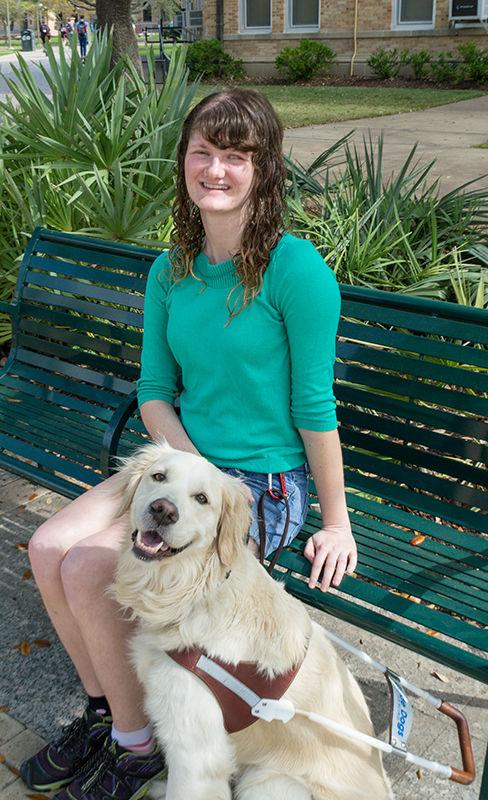For students like Kaitlyn Kellermeyer, who lost her vision last year, wind chimes will soon make it easier to navigate the large Texas A&M campus.
Since Summer 2014, the international studies junior has advocated for the placement of wind chimes at 10 key locations on campus for visually impaired students. All of the wind chimes have been funded, eight by the Aggie Honor Council and the remaining through sponsorships. As of March 16, the Student Senate bill concerning the chimes was signed by interim A&M President Mark Hussey.
Kellermeyer now plans on bringing the idea to major universities across Texas, like the University of North Texas and the University of Texas.
“I think it’s important because the problem goes beyond A&M,” Kellermeyer said. “I feel like there are other people at other campuses who are struggling with these issues — not understanding the campus, not having the orientation cues that they need to get around — and I feel like if we can provide this really simple solution to make such a difference in their lives, then I feel like it’s worth the effort that we put into it.”
In finalizing the project at A&M, Joseph Hood, political science junior and co-sponsor of the Student Senate bill advocating for wind chimes on campus, is working with administration on the logistics of the project.
“The concerns that [administration have] brought forward to us are sustainability,” Hood said. “Not only just the fact that they’re worried about wind chimes not being the most effective thing, but also the fact that eventually Kaitlyn and I are going to be gone, eventually [bill co-sponsor Collin Kruger] is going to be gone and so we have to make sure we have a sustainability plan in place.”
In order to help workshop her ideas to make them the best possible, Kellermeyer applied to be a delegate at the Global Engagement Summit held at Northwestern University in Illinois. From April 15-19, Kellermeyer will work with leaders of social change to cultivate her idea.
“The goal of the summit is to take projects that people already have either in mind or have semi-developed and to make them bigger, to help the students expand and to challenge their ideas and make them grow and make them stronger,” Kellermeyer said.
Jocie Padgen, co-chair of the American delegates at Northwestern, said the goal of the summit is to help cultivate the ideas of students who are trying to make a social impact.
“Our mission is really to build the capacity of the next generation of global social change leaders,” Padgen said. “So we provide them with tangible skills training through our workshops during the summit, we provide them with outcomes opportunities, with networking opportunities, with leaders in these fields that they’re going into, as well as kind of opportunities to just hear people talk about the state of our society today and how we can really strive to make an impact in the world around us.”
Kellermeyer said the summit will allow her to be able to interact with the other campuses to successfully bring her ideas to life.
“It’s going to have all this information that’s going to help me understand how to reach out to places that I’m not physically present in,” Kellermeyer said. “I feel like it’s easier here because I’m actually interacting with the people that I’m trying either convince or that I’m trying to work with. The summit is going to give me the skills that I need to reach out to places that I’m not going to be present in.”
Another reason Kellermeyer is interested in attending the summit is to ensure that the wind chime solution implemented at Texas A&M is the best possible solution.
“There’s some skepticism about the audio cue we’re using — the wind chimes — because it’s not a perfect solution,” Kellermeyer said. “You know, I’ll be asked things like, ‘Well what happens if the wind’s not blowing, what happens if they get tangled up?’ That’s actually something that this summit will really help me address because it’s something that we’ve been talking about since the beginning and we’re hoping that the wind chimes will be a segue to a more permanent solution.”
While her time at A&M may be limited, Kellermeyer said she is fully open to continuing her work beyond her time in school.
“If I keep getting the sort of response I’m getting from people here, just the enthusiasm which has been so inspiring and uplifting for me, then absolutely I would love to keep going and expand with it,” Kellermeyer said. “As long as people are on board with it, I’m willing to put in the work and the effort to make the change.”









